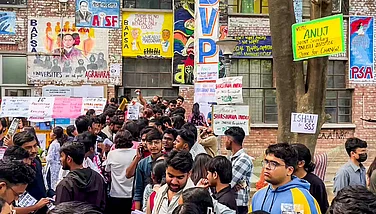Growing up in the small town of Jhansi, Uttar Pradesh, in the 1990s and the early 2000s, 23-year-old Bilal Khan taught himself English mainly through American television shows and the occasional Hollywood film on the cable network. In school, he would have laughed if someone had told him that he would go on to pursue English honours in college and pursue ‘culture studies’. Back when he was growing up, he had no conception of these fields of education. “It was either science or commerce,” Bilal laughs.
The Christ University alumnus now recalls that in those days, not many bright kids opted for ‘arts’. When it came to choosing a stream after passing his 10th, Bilal’s options were clear. He didn’t even think about opting for ‘humanities’. “In my state, ‘arts’ is not something young men are taught to aspire for. I grew up believing, like most other boys, that there is no future in studying arts. In fact, most schools in Jhansi at the time did not even offer humanities stream in Class 11 or 12,” recalls Bilal.
He adds that it’s not just about the purportedly limited career options available to students of humanities, but the sheer sexism of it that kept him and several other boys at bay. “The gendering of subjects is a very real phenomenon. Arts and humanities are seen as more “emotional” subjects. So poetry, literature is feminine and a man who expresses his feelings is feminine too,” Bilal adds.
The ‘Alice in Wonderland’ Effect
Across small towns of India like Jhansi and indeed even in urban metropolitans, ‘arts’ suffers similar biases: “It’s easy”, “it’s for women”, “it has no future”. Bilal feels that the discrimination stems from the low employability of these subjects. It isn’t just India, but across the world. Social sciences and liberal arts are often seen as the refuge of the “romantic scholar”, one whose contribution to society is noted, but not necessarily needed.
“I have friends who are getting international grants to study random things like the civilisational history of some arcane ritual practiced in some exotic part of the world. I don’t really understand it,” says Karan Malakar, a commerce student at Calcutta University. Malakar feels that sociology is mostly a “scam”. “Most of the research papers in EPW (Economic and Political Weekly) are written in complicated jargon, but end up making no real point,” he states. The 22-year-old, who aspires to be a “rich stockbroker” some day, states that research grants should only be given to students of ‘true sciences’. “That kind of research helps in furthering humanity. Like space travel or the cure for cancer,” he states.
As opposed to the ‘true scenes’, social sciences are often seen as an “extra”, like an appendage to the main body. “This bias does not just exist influencing the minds of students, but also holds sway over parents and within the fields of academia itself,” Bilal adds. It is common knowledge that lecturers with IIT degrees earn higher wages than lecturers with equivalent degrees in social sciences or linguistics.
This indicates that even the content in liberal arts and humanities courses is considered to be supplementary, the student states. He adds that such biases stem from the colonial mindset of “empiricism” as the metric for ‘good’ or valuable research.
Shibashis Chatterjee, a senior professor at the Department of International Relations at Jadavpur University states that the study of humanities and social sciences has been in a state of worldwide crisis for a while now. “Subjects that do not use quantification are labelled as easy. This is indeed a lazy and inappropriate scholarship. But it has its attractions. Humanities often tend to have an ‘Alice in Wonderland Effect’. We tend to merry-go-round endlessly. We lack precision. These are considered weaknesses by the canons of scientific standards,” he states.
However, the professor feels that the idea of competition amongst arts, science and technology is wrong. “These are complementary fields. To me, it is an identification problem. If natural sciences set the bar and humanities must measure up to it, there is no way they can meet the standards. Unless we agree to create our own standards, these accusations would never end. Hence, we must stop making these comparisons,” he states.
The professor of political thought and critical theory also adds that how society looks at knowledge is a political question. “From resource allocation to salaries, the logic of instrumentality trumps everything else,” Chatterjee states. The narratives through which liberal arts courses are shunned are all too familiar. Social sciences never had democratic equality with the natural/biological sciences and technological education. They are dismissed either as questionable or as useless. Modern education is predicated upon science and technology. It has increasingly reduced the space for criticality and reflective studies. Since the reigning paradigm is some variations on the theme of instrumentality, humanities and social sciences are automatically downgraded.
The current state of affairs forces one to question the commitment to liberal education as an approach to knowledge. If knowledge is about expanding the cognitive capacities of humankind with a view to realising latent talents, then humanities are indispensable.
In capitalist societies, education is just another financial sector and the loftier philosophical goals of education—the pursuit of knowledge and happiness in knowing—lie discarded. In such neo-liberal societies, it is perhaps infantile to hope for resource equality across streams of knowledge. However, the reality might be more nuanced than it initially appears. As many engineering institutions are shutting down for the want of jobs, many students are willing to take up humanities and social sciences as careers. Yet, the crisis of humanities only deepens with each passing year.
How to make it attractive?
It is significant that the students who pursue humanities do not study for the money. Humanities students are attracted to criticality and free imagination. Hence, higher salaries for science and engineering graduates do not make arts less attractive. Career in humanities and social sciences can be diverse and students who excel in communication skills do very well in professional careers. However, social studies also needs to keep pace with the changing dynamics of technology and the sciences, update its curriculum, and be ready to dialogue with young minds.
Humanities cannot be made more appealing by tying them to vocational needs. “That would be sounding the death knell to liberal education. The synchronisation of technology and humanities is happening all over the world and digital humanities is possibly the best example of this,” states Chatterjee.
Humanities can flourish when democratic values thrive in society, the spirit of questioning is highly regarded, and liberalism enjoys legitimacy. In other words, if philosophy matters to our lives, humanities is indispensable. There cannot be an effective instrumental argument in this direction.
But most researchers and students of humanities do not think any autocratic state would be fundamentally interested in reviving humanities and social sciences since these disciplines encourage critical thinking and questioning of authority structures. The more authoritarian states become, the less tolerant they will be of humanities and social sciences. Such examples can be seen in India, at present, where the revision of history and other ‘arts’ courses has led to several questions from educationists as to the purpose of the revisions. The removal of Mughal history from school textbooks, for instance, or the deletion of the politically loaded essay titled ‘300 Ramayanas’ by A K Ramanujan, which was recently removed from the Delhi University English curriculum, have all brought forth the question of how the national leadership is approaching knowledge and liberal arts.
Educationists note that it is in the interest of every nation or State to stand by these disciplines despite their own interests. But this requires tectonic shifts that may not be forthcoming anytime soon.
(This appeared in the print as 'The Easy 'A'')


























